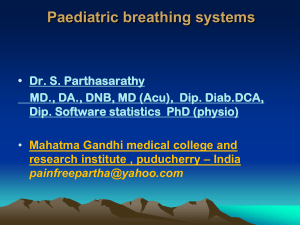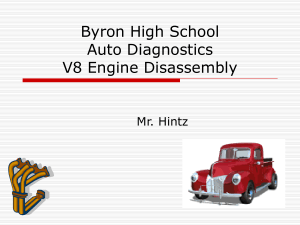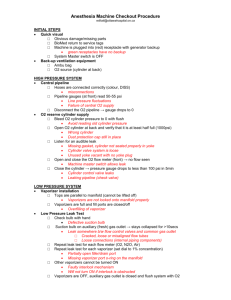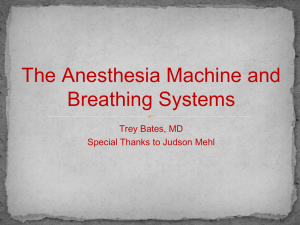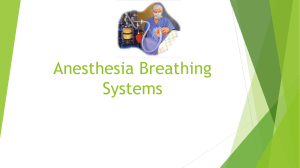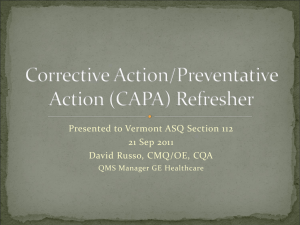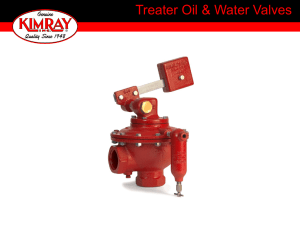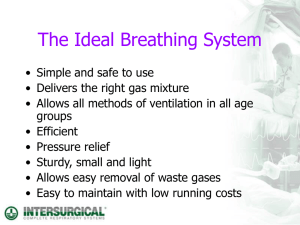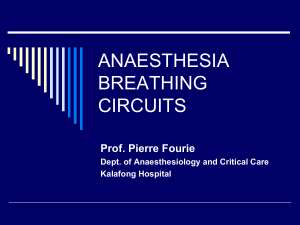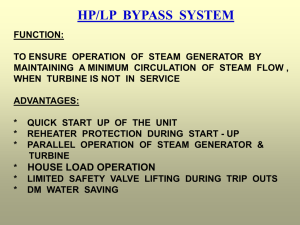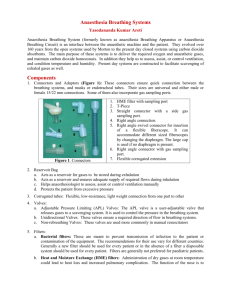Anesthesia Machine Amir Salah 2 of 4
advertisement
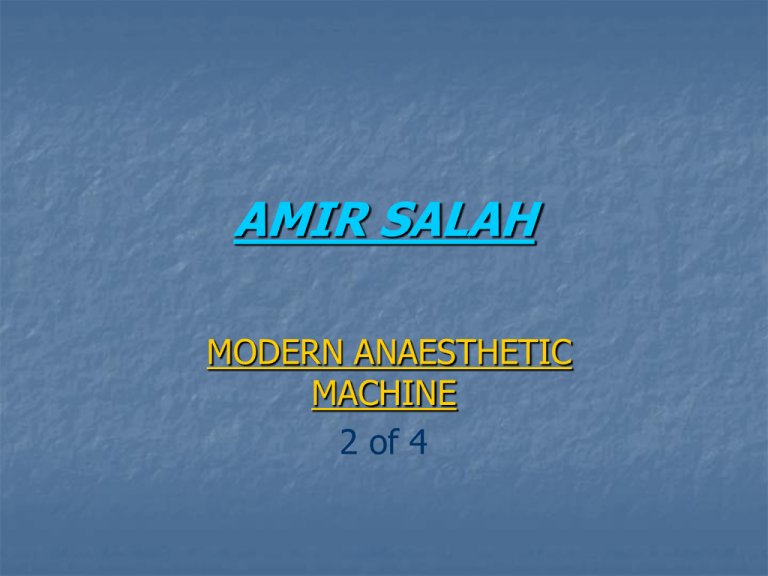
AMIR SALAH MODERN ANAESTHETIC MACHINE 2 of 4 CLASSIFICATION OF BS I. MODE OF RESPIRATION 1. Spontaneous : patient use his own muscles of respiration ; this needs neuronal and muscle power 2.Controlled :This needs no resistance to ventilation which can be achieved by means of : MR, central inhibition (anaesth,opioid,illness) or adaptation or cooperation in ICU patients. II.RATE OF FGF 1. Low FGF : < ½ MV or < alveolar v. 2. High FGF := or > MV III.REBREATHING 1.Total rebreathing. 2.Partial rebreathing. 3.No rebreathing. IV. OPEN OR CLOSED 1. Open : Insufflation ? 2. Semi-open : Open-drop ansth.? 3. Semi-closed :Mapleson ? 4. Closed. V. VALVES AND RESERVOIR PRESENCE 1. No valve or reservoir bag 2. Single adjustable spill valve and reservoir bag 3. In addition one or more unidirectional valves ,this group can be categorized into : With CO2 Without CO2 V. MAPLESON’S CIRCUITS In 1954 Mapleson described and analyzed five different semi-closed anaesthetic systems and are designated A,B,C,D,E. Willis and co-workers added the F system to the five original in 1975 In this systems there is a steady flow of FGF supplying a variable and cyclical tidal flow,in order to reach NO REBREATHING by alternating its components. Which are ? Components of Mapleson’s 1. Breathing tubes. 2. Fresh Gas Inlet. 3. Adjustable Pressure-Limiting Valve (APL) Pressure Relief Valve ;Pop-Off Valve 4.Reservoir Bag (Breathing Bag). 1.Breathing tubes Corrugated black (elephant tubing) BT made of rubber (reused) or plastic (disposable) with large diameter (22mm) creates a low resistance pathway which maintains its internal lumen patent when angled acutely. BT volume must be more than peak inspiratory flow(30L/min) or in combination with bag. 2.Fresh Gas Inlet The relative position of FGI is a key differentiating factor in Mapelson’s performance. FGI is in the beginning of “A” and in the end of others. 3.Adjustable pressure-limiting valve APL valve present near patient in Mapleson’s A,B,C and on the other end in D,E,F. If the gas flow is greater than the combined uptake of the patient and circuit compliance ,so the excess gas must be allowed to go out through APL valve controlling the pressure buildup. The exiting gas enter the operating room or preferably a scavenging system. The APL valve should be fully open during spontaneous respiration. Assisted and controlled ventilation require positive pressure during inspiration to expand lungs. Partial closure of the APL valve limits gas exit, permitting positive pressure during bag compression APL VALVE Unidirectional Valve AMBU 4.Reservoir Bag It presents in the beginning of “A” and at the end of the rest except “E” without. RB has elastic characteristics up to 5 K pascal(60 cmH2O).It is designed to increase in compliance as volume increase .Three distinct phases are recognized in RB filling 1. full of 3 L capacity 2.Pressure rises to a peak press. 3.Plateau pressure This ceiling effect helps to protect the lungs if APL valve is left in close position. A danger of RB is the possibility of bag material to be sucked across inlet to prevent this a metal or a plastic basket is fitted into the connector. function of RB 1. It allows BS to meet peak inspiratory flows that are greater than FGF. 2. It allows manual artificial ventilation. 3. monitors respiration in spontaneous vent 4. It allows testing for FGF and circuit leak 5. Increases compliance of system if there is an obstruction to the outflow.
